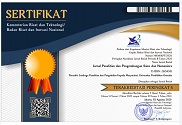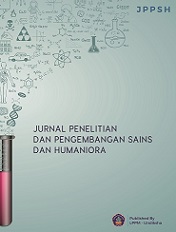Determinan Faktor yang Mempengaruhi E-Trust dan Minat Menggunakan Aplikasi Alodokter
DOI:
https://doi.org/10.23887/jppsh.v5i3.38683Keywords:
E-Wom, E-Trust, MinatAbstract
Pandemi Covid-19 menyebabkan keresahan pada masyarakat, sehingga peran aplikasi kesehatan digital sangat penting di masa pandemi. namun posisi aplikasi Alodokter digantikan oleh pesaingnya, sehingga diindikasikan bahwa minat menggunakan Alodokter menurun. Penelitian ini bertujuan untuk menganalisis determinan faktor yang mempengaruhi e-trust dan minat menggunakan aplikasi Alodokter. Populasi pada penelitian ini adalah pengguna aplikasi Alodokter. Penentuan sampel menggunakan insidential sampling, dengan jumlah sampel sebanyak 105 orang responden. Penelitian ini adalah penelitian kuantitatif dengan pendekatan deskriptif. Teknik analisis data mengunakan pendekatan PLS. Hasil penelitian menunjukkan bahwa E-WOM berpengaruh positif signifikan terhadap E-Trust pada aplikasi Alodokter. Fitur layanan tidak berpengaruh signifikan terhadap E-Trust pada aplikasi Alodokter. Perceived usefullness berpengaruh positif signifikan terhadap E-Trust pada aplikasi Alodokter. E-WOM tidak berpengaruh signifikan terhadap minat menggunakan pada aplikasi Alodokter. Fitur layanan tidak berpengaruh signifikan terhadap minat menggunakan pada aplikasi Alodokter. Perceived usefullness tidak berpengaruh signifikan terhadap minat menggunakan pada aplikasi Alodokter. E-Trust berpengaruh positif signifikan terhadap minat menggunakan pada aplikasi Alodokter. Implikasi penelitian ini diharapkan dapat menjadi bahan masukan serta pertimbangan bagi manajemen aplikasi Alodokter agar lebih membuka wawasan dalam meningkatkan minat menggunakan aplikasi Alodokter yang dapat dilakukan dengan meningkatkan perceived usefullness dari aplikasi Alodokter.
References
Abubakar, A. M., & Ilkan, M. (2016). Impact of online WOM on destination trust and intention to travel: A medical tourism perspective. Journal of Destination Marketing and Management, 5(3), 192–201. https://doi.org/10.1016/j.jdmm.2015.12.005.
Adiwijaya, I. G. B. P. (2018). Kemudahan Penggunaan, Tingkat Keberhasilan Transaksi, Kemampuan Sistem Teknologi, Kepercayaan dan Minat Bertransaski Menggunakan Mobile Banking. Jurnal Manajemen Dan Bisnis, 15(3), 135–153. https://doi.org/10.38043/jmb.v15i3.611.
Agag, G., & El-Masry, A. A. (2016). Understanding consumer intention to participate in online travel community and effects on consumer intention to purchase travel online and WOM: An integration of innovation diffusion theory and TAM with trust. Computers in Human Behavior, 60(2), 97–111. https://doi.org/10.1016/j.chb.2016.02.038.
Alalwan, A. A. (2020). Mobile food ordering apps: An empirical study of the factors affecting customer e-satisfaction and continued intention to reuse. International Journal of Information Management, 50(3), 28–44. https://doi.org/10.1016/j.ijinfomgt.2019.04.008.
Arfi, W. Ben, Nasr, I. Ben, Kondrateva, G., & Hikkerova, L. (2021). The role of trust in intention to use the IoT in eHealth: Application of the modified UTAUT in a consumer context. Technological Forecasting and Social Change, 167(7). https://doi.org/10.1016/j.techfore.2021.120688.
Bakhtiar, M., Elbuluk, N., & Lipoff, J. B. (2020). The digital divide: How COVID-19’s telemedicine expansion could exacerbate disparities. In Journal of the American Academy of Dermatology (Vol. 83, Issue 5, pp. e345–e346). https://doi.org/10.1016/j.jaad.2020.07.043.
Choi, K., Gitelman, Y., Leri, D., Deleener, M. E., Hahn, L., O’Malley, C., Lang, E., Patel, N., Jones, T., Emperado, K., Erickson, C., Rosin, R., Asch, D., Hanson, C. W., & Adusumalli, S. (2021). Insourcing and scaling a telemedicine solution in under 2 weeks: Lessons for the digital transformation of health care. Healthcare, 9(3). https://doi.org/10.1016/j.hjdsi.2021.100568.
Fhonna, R. A., & Sorayanti Utami. (2018). Pengaruh electronic word of mouth terhadap keterlibatan keputusan pembelian dan kepercayaan sebagai pemediasi pada konsumen shopee di Universitas Syiah Kuala. Jurnal Ilmiah Mahasiswa Ekonomi Manajemen, 3(3), 20–32. https://doi.org/10.24815/jimen.v3i3.8081.
Fitriyani, I., Sudiyarti, N., & Fietroh, M. N. (2020). Strategi Manajemen Bisnis Pasca Pandemi COVID-19. Indonesian Journal of Social Sciences and Humanities, 1(2), 87–95. https://doi.org/10.15797/concom.2019..23.009.
Gao, B., & Huang, L. (2019). Understanding interactive user behavior in smart media content service: An integration of TAM and smart service belief factors. Heliyon, 5(12). https://doi.org/10.1016/j.heliyon.2019.e02983.
Hsieh, Y. (Jerrie), Chen, Y. L., & Wang, Y. C. (2021). Government and social trust vs. hotel response efficacy: A protection motivation perspective on hotel stay intention during the COVID-19 pandemic. International Journal of Hospitality Management, 97(7). https://doi.org/10.1016/j.ijhm.2021.102991.
Hsu, C. L., Chen, Y. C., Yang, T. N., & Lin, W. K. (2017). Do website features matter in an online gamification context? Focusing on the mediating roles of user experience and attitude. Telematics and Informatics, 34(4), 196–205. https://doi.org/10.1016/j.tele.2017.01.009.
Ismail, M. N. I., Hanafiah, M. H., Aminuddin, N., & Mustafa, N. (2016). Community-based Homestay Service Quality, Visitor Satisfaction, and Behavioral Intention. Procedia - Social and Behavioral Sciences, 222(2), 398–405. https://doi.org/10.1016/j.sbspro.2016.05.192.
Izzani, M., Marzuki, I., Rosly, A. N., Roslan, N. S., Abdullah, D., Bahri, S., Kamal, M., & Azmi, A. (2016). The role of perceived interactivity , perceived ease of use, perceived usefulness , and perceived enjoyment toward intention to use online mapping service applications. International Academic Research Journal of Business and Technology, 2(2), 135–139. https://www.researchgate.net/publication/311676123.
Jayantari, I. A. A. U., & Seminari, N. K. (2018). Peran Kepercayaan Memediasi Persepsi Risiko terhadap Niat Menggunakan Mandiri Mobile Banking di Kota Denpasar. E-Jurnal Manajemen Universitas Udayana, 7(5), 2621. https://doi.org/10.24843/ejmunud.2018.v07.i05.p13.
Kala Kamdjoug, J. R., Wamba-Taguimdje, S. L., Wamba, S. F., & Kake, I. B. E. (2021). Determining factors and impacts of the intention to adopt mobile banking app in Cameroon: Case of SARA by afriland First Bank. Journal of Retailing and Consumer Services, 61(1). https://doi.org/10.1016/j.jretconser.2021.102509.
Kusuma, R. (2011). Evaluasi Penerapan Sistem Informasi Manajemen Keimigrasian (SIMKIM) Kantor Imigrasi Kelas I Yogyakartaf. Jurnal Fisip Umrah, 1.(1), 287–295. https://doi.org/10.1016/j.sbspro.2015.04.
Liao, S. H., Hu, D. C., Chung, Y. C., & Huang, A. P. (2021). Risk and opportunity for online purchase intention – A moderated mediation model investigation. Telematics and Informatics, 62(2). https://doi.org/10.1016/j.tele.2021.101621.
Lin, W. R., Lin, C. Y., & Ding, Y. H. (2020). Factors affecting the behavioral intention to adopt mobile payment: An empirical study in Taiwan. Mathematics, 8(10), 1–19. https://doi.org/10.3390/math8101851.
Lorente-Martínez, J., Navío-Marco, J., & Rodrigo-Moya, B. (2020). Analysis of the adoption of customer facing InStore technologies in retail SMEs. Journal of Retailing and Consumer Services, 57(7). https://doi.org/10.1016/j.jretconser.2020.102225.
Lu, B., Wang, Z., & Zhang, S. (2021). Platform-based mechanisms, institutional trust, and continuous use intention: The moderating role of perceived effectiveness of sharing economy institutional mechanisms. Information and Management, 58(7). https://doi.org/10.1016/j.im.2021.103504.
Mekawie, N., & Hany, A. (2019). Understanding the Factors Driving Consumers’ Purchase Intention of over the Counter Medications Using Social Media advertising in Egypt. Procedia Computer Science, 164(4), 698–705. https://doi.org/10.1016/j.procs.2019.12.238.
Moslehpour, M., Pham, V. K., Wong, W. K., & Bilgiçli, I. (2018). e-purchase intention of Taiwanese consumers: Sustainable mediation of perceived usefulness and perceived ease of use. Sustainability (Switzerland), 10(1). https://doi.org/10.3390/su10010234.
Nasution, D. A. D., Erlina, E., & Muda, I. (2020). Dampak Pandemi COVID-19 terhadap Perekonomian Indonesia. Jurnal Benefita, 5(2), 212. https://doi.org/10.22216/jbe.v5i2.5313.
Nawangsari, S., & Iswah, S. N. (2019). Pengaruh Teknologi Informasi, Persepsi Manfaat, Persepsi Kemudahan, dan Fitur Layanan terhadap Kepuasan Nasabah serta Implikasinya pada Minat Ulang Penggunaan Aplikasi Jenius Bank BTPN. Seminar Nasional APTIKOM (SEMNASTIK), 1(1), 144–151. https://publikasi.dinus.ac.id/index.php/semnastik/article/view/2777.
Park, C. W., Sutherland, I., & Lee, S. K. (2021). Effects of online reviews, trust, and picture-superiority on intention to purchase restaurant services. Journal of Hospitality and Tourism Management, 47(7), 228–236. https://doi.org/10.1016/j.jhtm.2021.03.007.
Setyaningsih, E. D. (2017). Pengaruh Kualitas Layanan Dan Word Of Mouth Melalui Minat Terhadap Keputusan Nasabah Dalam Menggunakan E-Banking Pada Bank Bni. Jurnal Ilmiah Ekonomi Bisnis, 22(1). https://ejournal.gunadarma.ac.id/index.php/ekbis/article/view/1506.
Sharma, V. M., & Klein, A. (2020). Consumer perceived value, involvement, trust, susceptibility to interpersonal influence, and intention to participate in online group buying. Journal of Retailing and Consumer Services, 52(2). https://doi.org/10.1016/j.jretconser.2019.101946.
Song, H. J., Ruan, W. J., & Jeon, Y. J. J. (2021). An integrated approach to the purchase decision making process of food-delivery apps: Focusing on the TAM and AIDA models. International Journal of Hospitality Management, 95(5). https://doi.org/10.1016/j.ijhm.2021.102943.
Stouthuysen, K. (2020). The building of online trust in e-business relationships. Electronic Commerce Research and Applications, 4(10). https://doi.org/10.1016/j.elerap.2020.100929.
Sugiyono, P. D. (2019). MetodePenelitian Kuantitatif, Kualitatif dan R&D. Bandung: PT Alfabet. In Sugiyono. (2019). MetodePenelitian Kuantitatif, Kualitatif dan R&D. Bandung: PT Alfabet. https://doi.org/10.1017/CBO9781107415324.004
Susilo, A., Rumende, C. M., Pitoyo, C. W., Santoso, W. D., Yulianti, M., Herikurniawan, H., Sinto, R., Singh, G., Nainggolan, L., Nelwan, E. J., Chen, L. K., Widhani, A., Wijaya, E., Wicaksana, B., Maksum, M., Annisa, F., Jasirwan, C. O. M., & Yunihastuti, E. (2020). Coronavirus Disease 2019: Tinjauan Literatur Terkini. Jurnal Penyakit Dalam Indonesia, 7(1), 45. https://doi.org/10.7454/jpdi.v7i1.415.
Talwar, S., Dhir, A., Khalil, A., Mohan, G., & Islam, A. K. M. N. (2020). Point of adoption and beyond. Initial trust and mobile-payment continuation intention. Journal of Retailing and Consumer Services, 55(5). https://doi.org/10.1016/j.jretconser.2020.102086.
Tran, G. A., & Strutton, D. (2020). Comparing email and SNS users: Investigating e-servicescape, customer reviews, trust, loyalty and E-WOM. Journal of Retailing and Consumer Services, 53(3). https://doi.org/10.1016/j.jretconser.2019.03.009.
Yuda Bakti, I. G. M., Rakhmawati, T., Sumaedi, S., Widianti, T., Yarmen, M., & Astrini, N. J. (2020). Public transport users’ WOM: An integration model of the theory of planned behavior, customer satisfaction theory, and personal norm theory. Transportation Research Procedia, 48(05), 3365–3379. https://doi.org/10.1016/j.trpro.2020.08.117.
Downloads
Published
Issue
Section
License
Authors who publish with the Jurnal Penelitian dan Pengembangan Sains dan Humaniora agree to the following terms:
- Authors retain copyright and grant the journal the right of first publication with the work simultaneously licensed under a Creative Commons Attribution License (CC BY-SA 4.0) that allows others to share the work with an acknowledgment of the work's authorship and initial publication in this journal.
- Authors are able to enter into separate, additional contractual arrangements for the non-exclusive distribution of the journal's published version of the work (e.g., post it to an institutional repository or publish it in a book), with an acknowledgment of its initial publication in this journal.
- Authors are permitted and encouraged to post their work online (e.g., in institutional repositories or on their website) prior to and during the submission process, as it can lead to productive exchanges, as well as earlier and greater citation of published work. (See The Effect of Open Access)









